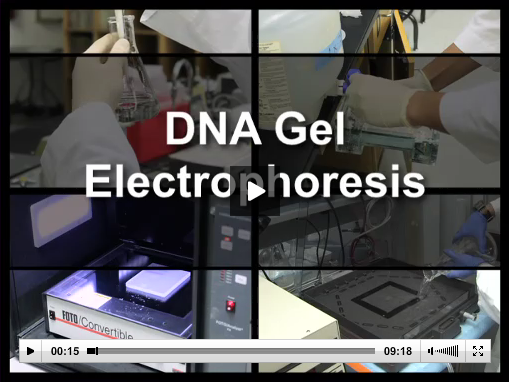Join us over the next 30 days as we explore a variety of demonstrations on fundamental techniques (today, DNA gel electrophoresis) in the lab.
Imagine if all scientific research and experiments were automated. “Siri,” you could say to your computer, “Cast and run an agarose gel for DNA gel electrophoresis.” Reagents would begin mixing and eventually you’d have results on your DNA samples. With the efforts you save forgoing the time-consuming process of reviewing a lengthy DNA gel protocol, you might decide to, say, call your mother or go to lunch with your colleagues.

But preforming even the most basic lab techniques isn’t that easy—especially for first-timers. It can be time-consuming and difficult to discover, for example, that semester after semester your students still don’t know how to do DNA gel electrophoresis after you’ve demonstrated it to them 5 times. For this reason, we are embarking on a 30-day exploration of our Science Education videos. Each day of the week we’ll be highlighting a different fundamental technique and video on our blog. And it doesn’t matter if you aren’t a subscriber. The Science Education database is available free through the end of 2013.
Kicking it off, we’d like to share a video demonstration of DNA Gel electrophoresis were we show you the concept behind the method, how to prepare the agarose gel, how to load your samples, how to run the gel and analyze it, and some common applications of agarose gel electrophoresis.
In Science Education, JoVE covers foundational scientific techniques via video—covering methods like DNA gel electrophoresis (Basic Methods in Cellular and Molecular Biology), RNAi in C. Elegans (Model Organisms I), and Fluorescence Microscopy (General Laboratory Techniques).
Who is the Science Education collection for? Anybody—whether you’re are an experienced scientist reviewing a technique you haven’t preformed in years or whether you’re new to the lab. Science Education is also a great way to familiarize young scientists with the lab and with journal formatting.
Enjoy the video, and good luck with running your gel.




